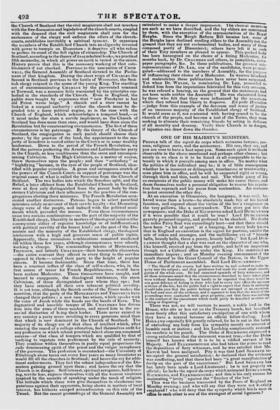ONE OF HIS MAJESTY'S MINISTERS.
PEOPLE talk of the esprit du corps which animates lawyers, Dar- sons, religious sects, and the aristocracy. Hit one, they say, and you are sure to have a host upon you. Some such spirit is no doubt observable in the above-mentioned and perhaps other classes; but surely in no class is it to be found at all comparable to the in- tensity in which it prevails among men in office. No matter what the politics of the individual may be; it is of little consequence whether he is innocent or delinquent, treacherous or trustworthy ; once place him in office, and he will be supported right or wrong, through thick and thin, tooth and nail. The whole gang of his co-recipients of the public money will make his cause theirs, and deem themselves under a personal obligation to rescue his reputa- tion from reproach and his purse from contraction. An instance in point occurred the other day. At an execution in Gloucester, the hangman, it was sail, be- haved worse than a brute—he absolutely made fun of his horrid function, and capered about the victim of the law's vengeance on the very gallows, like a merryandrew. The story got into the newspapers; and the Duke of RICHMOND asked Lord DUNCANNON if it were possible that it could be true ? Lord Delve ANNors gravely promised inquiry, and professed to be shocked. No doubt the noble Privy Seal was exceedingly hurt—not that there should have been "a bit of sport" at a hanging, for every body knows that in England an execution is the signal for pastime, amidst the sale of cakes and sausages, and the mellifluous cry of " brandy balls, brandy balls, three a penny, brandy balls ;" but Lord DUN- CANNON thought that a slur was cast on the character of one who, like himself, received pay from the public, and held an important though not a Cabinet office under the King. Ile instituted an immediate inquiry ; and on Monday evening communicattd the result thereof to the Great Council of the Nation, in the Upper House of Parliament assembled. Said Lord DUNCA.NNON- " The Sheriff of the county had been written to, and ordered to make hi- quiry into the subject; and that gentleman had made the most ample investi- gation of the whole case. He had examined upwards of forty witnesses; and all these witnesses stated that the circumstances described to have taken place were without foundation. It was hardly to be expected that there would be any great delicacy of feeling in those who had to carry into effect the extreme sentence of the law, but the public had a right to expect that those in authority should take care that the public feelings were not outraged at an execution. He had read over all the evidence, and it appeared to him that the whole of the proceedings were conducted with great propriety, and that there was nothing in the conduct of the executioner which could justly be described as either re- volting or disgusting." There was not, we will venture to assert, a noble lord in the House, who sits or has sat on the Treasury bench, but breathed more freely after this satisfactory exculpation of one with whom they have a natural because an official fellow-feeling. Lord HOLLAND especially felt greatly relieved, for he is not in the habit of excluding any body from his sympathy merely on account of humble rank or station ; and his Lordship complacently restored his cambric to his pouch. The Duke of RICHMOND expressed a strong satisfaction that the statement was not true,—for the Duke himself has known what it is to be a vilified servant of his Majesty. Lord ELLENHOROUGH also had taken the pains to read the depositions of forty witnesses, and he was satisfied that Mr. KETCH had been maligned. Pity it was that Lord SEGRAVE m- ien opted the general satisfaction : he declared that the evidence was conflicting, and that there had been "a great manifestatIon of levity on the part of the executioner." But Lord SEGRAVE has but lately been made a Lord-Lieutenant ; be is not properly an official; lie lacks the esprit du corps which animated DUNCANSION, RICHMOND, and Essemeououcat ; and this is his only excuse for insinuating " levity " against the " finisher of the law. This was the business transacted by the Peers of England on Monday evening ; and who will say that they were not worthily employed? who will deny that the sympathy which binds men in office to each other is one of the strongest of social ligatures ?


























 Previous page
Previous page